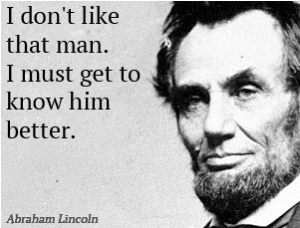I have spent a lot of my life judging people – unfortunately one of my responsibilities in a previous job was to ‘assess’ people at work – I had to judge them.
How do we do this – how did I do this?
I used a ‘behavioural and analytical capabilities’ list of attributes in assessing staff and students.
This was later changed and modified in line with modern (read trendy) ’employability skills’ that were required for a job which was in addition to any technical skills in doing it. This new method, which I thought was quite fair, involved observed behaviours under a series of headings. This was supposed to prevent the assessment of ‘he has a bad attitude’ or ‘we didn’t like him/her.’ It was about observable behaviour – or the facts. (If anyone is interested in me writing about the other 9 employability skills I developed and used – let me know and I will include them in future posts and perhaps make a ‘business reference’ section to my site).
It was also about assessing someone in preparation for how they would behave actually doing the job. The example I always use it that imagine you have a guy (or girl) who is a skilled, talented carpenter that can make anything with precision – yet, they disrupt the workplace, jack up management, have a tendency to be a bully – and generally can’t get along with people – even to the point it doesn’t mater what the customer ordered they make it their way as that is the best way. Skilled, yes; do I want to employ them, no; this is the basis of ’employability skills’. I suppose a lot of businesses now do some form of psychological testing, but in a previous job the psychologist was madder than most of us!
But, the assessment of these ’employability skills’ can not be subjective and must be objective and open to testing and scrutiny – hence, something that is based only on observable, quantifiable, recorded and perhaps even sustained behaviour (after all we are all allowed the occasional bad day – just not involving assaults, guns or death!)
One of the headings under the employability skills I used was Judgement.
The general description was:
This employability skill involves balancing big picture thinking with a focus on the ‘here and now’ ensuring adequate deliberation without delaying decision making, considering the broader impact, achieving compromise, making impartial, informed decisions and using intellect in the decision making process.
These sort of ‘trendy worded’ motherhood statements are of course a great reason to shit-can someone you don’t like – or to promote/employ your mate. The entire paragraph is open to interpretation.
So, with any observable thing you have to be able to record what you observe – plus it is good to know what you are looking for or equally important what they are not doing.
The observable behaviour to indicate good or bad judgement I used were:
- Understands information which may impact upon long term goals or directions.
- Pulls together ideas, issues and observations in order to reach a conclusion.
- Recognises patterns between current data and past situations by observing discrepancies, trends and interrelationships, bringing a fresh approach to recurring problems.
- Uses sound judgement in selecting a course of action for goals by logically weighing up alternatives.
- Uses information systems and technology to effectively problem solve.
- Supports calculated risk taking.
- Demonstrates a solution focus.
- Evaluates strengths, accuracy and quality of decisions.
- Identifies weaknesses of approach, inaccuracy of detail and ineffective decisions.
- Takes corrective action by identifying a more effective approach, process or outcome.
- Accepts responsibility and accountability for decisions.
I found that there is nothing better in helping people (read helping them, not shit canning them!) become better at just about any task, than to actually be able to give them examples and explain what they did wrong or more importantly what they did right.
e.g: (using one of the above ‘observable behaviours’)
“John (fictional character), In looking at your performance lately it would appear that you are having some difficulty in making appropriate judgement calls. In a recent matter things were going off track through no fault of your own, yet it appeared you were not able to take the appropriate corrective actions to solve the problem and work towards a more effective approach. What can we do to improve you ability to show good judgement in these circumstances in the future”
Or (and better – see my post on Better an Appreciative Question)
“John (fictional character – not related to the John above who is a bit of a fuck up!), In looking at your performance lately you have made some good judgement calls. In a recent matter things were going off track through no fault of your own, yet you were able to take the appropriate corrective actions to solve the problem and work towards a more effective approach. Tell us the process you used for this as I think it is a real attribute you have and could help the company and other employees in the future.”
Of course all the appropriate detail regarding what the ‘problem’ was and the specific observations made should be included.
I think any assessment, judgement of anyone must be a matter of facts.
The old adage of ‘not telling a book by it’s cover’ is easy to agree with but often hard to do, when we first have to get rid of our own prejudices, first impressions, rumours, personal preferences and most of all deciding to treat someone the way we would like to be treated ourselves.
Of course this takes into account that we all can’t be astronauts and some people will only need to learn the phrase “do you want fries with that” to lead a happy and productive life. But, we have to stop promoting people to their highest level of incompetence – even if they are our friend or a friend of a much higher friend, or their, God forbid, a boy/girl friend of a friend!) Likewise the person we don’t like may actually be the best person for the job and our only real worry is that their next promotion is actually into our job.
Judgement is about observation and objectivity, not subjectivity and suspicion.
Judgement is also about practicing judgement, learning that we are doing it on facts and observations and nothing else.

– That CV just looks too good…
– I like them, but…
– I don’t like them, why…
